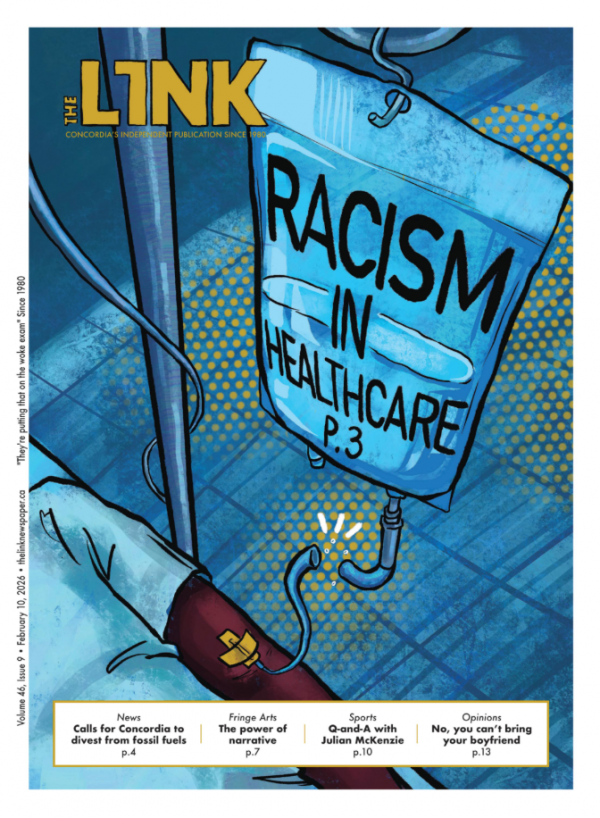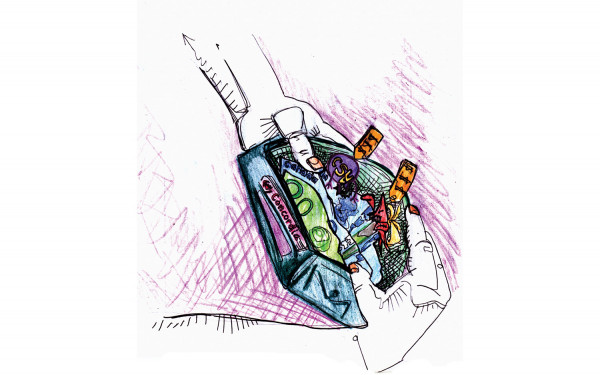The Link’s Editorial Endorsements Since 1980
It’s a Part of Democracy
People seemed to have been taken aback by The Link’s editorial endorsement of Concordia Student Union candidates the day polling began.
There were calls for neutrality and some even called it “cheating.” But, guess what? It’s a newspaper’s democratic right to publish editorials. In fact, it’s is in line with traditional practices of news publications around the world.
Does this mean editorials always reflect the collective opinion of the readers, listeners and viewers or the population at large? Absolutely not—it reflects the opinions of an editorial team.
In the last Montreal municipal elections, The Gazette, Le Devoir and La Presse endorsed a second term for Denis Coderre. Coderre lost.
For the last U.S. presidential elections, Hillary Clinton received 240 newspaper endorsements across the U.S. while Donald Trump received 19. Clinton lost.
Did The Link break any CSU regulations? The latest Judicial Board ruling—which was unanimous—informs us that this wasn’t the case.
Editors at The Link are in the office almost every day. In fact, I’m pretty sure the security guards at the Hall Building think we were a bunch of losers for spending entire Saturdays and Sundays at our office.
But what we do as journalists comes from a sense of duty to keep the communities around us informed about one another.
We gather information. We share information. We keep people in check. Inadvertently, we make people upset.
That being said, as reporters and editors, we handle a larger amount of information, more than most people. We speak to activists, community organizers, administrators, politicians, the police, business owners, labour unions, all for the sake of giving readers the most accurate sense of history as it unfolds.
When we gather and publish stories, we try to do so with the utmost care and balance. We make sure what we’re publishing isn’t illegal or libellous. We’re very aware that in some cases, we’re playing with fire. It’s part of what we study at the journalism department, for those of us who are journalism students.
We try to hold ourselves to a high standard. We argue daily with one another. At the end of the day (as one of our former editors, now in the pro-league told me recently), the right idea has to win.
Every week, editors meet to discuss the events which unfolded during the week. Then we decide what to collectively say through our editorials. Editors who did the original reporting on the events aren’t allowed to write an editorial on the same subject. Editors in positions of conflict of interest are not allowed take part in the discussions and have to leave the room.
Last year, one editor had to leave the editorial meeting because his brother was a candidate in the CSU elections. This was transparent in the editorial. The meeting concluded with no endorsement of a CSU executive slate.
Back in 2011, the Editor-in-Chief of The Link was dating the then-President of the CSU. That editor was never allowed to take part in meetings where political coverage was discussed.
In some cases, editors cannot agree on a position. That is made transparent in the editorial, as well.
Not only do we gather information, but we hold in-depth knowledge about the history of Concordia.
Every year, we go over the history our publication. Editors also pass down knowledge to newcomers about the history of Concordia student politics and the energy and mobilization that it took to implement certain Concordia and CSU policies and to build the specialized services we benefit from today: an independent student union, four media outlets, advocacy centres, co-ops, etc.
That’s the point of a publication. It’s part information gathering, part historical interpretation, part editorial stance.
The Link is an independent publication. It is beholden to its stakeholders, the undergraduate students, who are invited to convene each year at our general assembly. The Link itself has been around since 1980, before the merger of Loyola News and The Georgian, which had been publishing since 1924 and 1936, respectively.
Since 1980, The Link hasn’t always made political endorsements, but it has nonetheless. Here a list from the archives:
Tuesday, March 6, 1984 – Volume 4, Issue 39, p. 8
”The Link editorial board has decided to endorse the slate of Paul Gott and Dean Nellis in the upcoming CUSA [the precursor to the CSU] co-presidential elections. The decision was made with some reservations after it was agreed that Gott and Nellis were clearly the best of a bad lot. It should be seen less as approval of their candidacy than as a definite rejection of the other three slates in contention.”
I’d like to point out that 34 years and 34 tattoos later, Paul Gott now teaches in the Department of Journalism at Concordia University. Gott also lost that election.
Concordia University Student Association Elections were held on March 6, 7 and 8, 1984.
Friday, February 1, 1991 – Volume 11, Issue 30, p. 5
In an editorial titled “The only choice,” The Link wrote:
“Taking all of the above into account, it is fairly obvious that only viable choice for voters is the team of Nero and Brown. And it would be easy for The Link’s critics to call our endorsement of these women favoritism.
It’s not. Nero and Brown are capable and intelligent and not supporting them in some misguided effort to appear ‘fair and objective’ would be a mistake.
They will have good co-presidents and right now, what CUSA needs most is the strong and effective leadership that Nero and Brown are capable of providing.”
Nero and Brown were on the board of directors of The Link. The board had no editorial control. Both had requested a leave of absence from the board for the duration of the elections.
Polling was on Feb. 5 to 7, 1991.
The Link publishes an Anti-Racism issue on Feb. 5, 1991. As such, the editorial titled “A new order is needed” calling out systemic racism and the power held by white men in society’s institutions.
Tuesday, Feb. 18, 1992 – Volume 12, Issue 34, p. 14
The Link endorses Nero and Phil Toone’s co-presidential team.
Polling was on Feb. 18, 19 and 20, 1992.
Tuesday, March 16, 1993 – Volume 13, Issue 36, p. 9
”The Link has not, and will not, endorse any of the three remaining co-presidential candidacies.”
Following the previous year’s elections, CUSA got tangled into “legalistic technicalities” after the union’s board did some sketchy stuff leading them to appear in Quebec Court.
No information on the polling dates could be found.
Tuesday, March 23, 2004 – Volume 24, Issue 27, p. 23
In an editorial titled, “CSU elections: the good, the bad and the undemocratic,” The Link did not endorse any candidate, but instead broke down their pros and cons for all slates and referendum questions.
Polling was on March 23, 24 and 25, 2004.
Tuesday, March 29, 2005 – Volume 25, Issue 28, p. 23
The Link calls on students to vote in a fight against voter apathy, but not without insinuating that the returning slate had an ineffective year.
Polling was on March 29, 30 and 31, 2005.
Tuesday, March 21, 2006 – Volume 26, Issue 26, p. 39
The editorial, “Experience, Evolution—oh, who can tell the difference?” explained how it seemed like the old CSU executive threw together a jumble of new faces to take over for them. They even campaigned for the Experience slate. While no explicit endorsement was made by The Link, the editorial heavily criticized the slate.
“The first rule to pulling together a slate is actual experience, and frankly, Experience hasn’t got any,” The Link wrote.
Polling was on March 28, 29 and 30, 2006.
Tuesday, March 25, 2008 – Volume 28, Issue, p.23
The editorial was titled “Why spoil your ballot? — And why voting ‘no’ is different.”
“An election costs the union (read: students) tens of thousands of dollars,” Editor-in-Chief Giuseppe Valiante wrote. “Voting ‘no’ will force this deeply flawed process to repeat itself all over again. Voting ‘abstain’ is ostensibly the same as spoiling your ballot, but, in the humble opinion of The Link, much less fun.”
The editorial was a protest call against a dysfunctional crony CSU and elections based on amassing popularity votes and meddling by the Concordia University Alumni Association.
Polling was on March 25, 26 and 27, 2008.
Tuesday, March 29, 2011 – Volume 31, Issue 28 p.39
The Link endorsed the Your Concordia slate and mildly condemned the Action slate.
“So decide. You actually have the choice to re-elect the status quo or vote for something better,” The Link wrote.
Polling was on March 29, 30 and 31, 2011.
Tuesday, March 26, 2013 – Volume 33, Issue 27 p.23
The CSYou team ran unopposed except for the VP Finance position.
“[…] CSYou candidate Scott Carr is the better choice: while his opponent, Pierre Tardivo Martin, is looking to promote ethical investments, Carr is the only one of the two who actually has a long-term plan in place and initiative behind it,” The Link wrote.
Polling was on March 26, 27 and 28, 2013.
Tuesday, March 29, 2016 – Volume 36, Issue 26 p.15
Editorial: “Let’s Act Together in the CSU Elections.”
“Emphasis should always be placed on the individual candidates, rather than the slates they’re running with. But these people are running on teams and thus they can be evaluated as such. Put simply, Act Together has more Concordia know-how than Empower Concordia,” The Link wrote.
Polling was on March 29, 30 and 31, 2016.
Tuesday, March 28, 2017 – Volume 37, Issue 26 p.19
Editorial: “The Link’s Take on the CSU Elections and Referendum Questions.”
“Before explaining our take on the situation, we want to make it clear that our managing editor Jon Milton—the brother of Alexander Milton, a candidate for Team Connect—left the newsroom during our discussion surrounding a possible CSU team endorsement,” The Link wrote.
“After having reviewed every team that is running in these elections, we have come to the conclusion that we will not be endorsing any of them.”
Polling was on March 28, 29 and 30, 2017.
Tuesday, March 27, 2018 – Volume 38, Week 25, Online
Editorial: “We’re Voting for Speak Up.”
“Speak Up’s platform is the most fleshed out, and presents a vision for the CSU that addresses the issues that increasingly define life at our university,” The Link wrote.
“As a response to the allegations of sexual misconduct that plague our university, Speak Up will seek to help student associations and clubs implement intersectional and survivor-centred sexual violence policies based on the national Our Turn action plan. Advance CSU and ACT Concordia lack concrete plans to address the issue of sexual violence on campus.”
Polling was on March 26, 27 and 28, 2018.
Given the JB ruling overturning the Chief Electoral Officer’s decision to disqualify a slate based on an editorial endorsement, I’m sure students you can expect more of these endorsements in the future.
Thank you to Harrison-Milo Rahajason for helping to go through the archives.

_900_600_90_900_600_90.jpg)




